Do you need help to drive organic traffic to your e-commerce website?
Well, you have come to the right place.
In this article, you will learn all the strategies you will ever need to drive unlimited traffic to your e-commerce website, boost sales and increase profit.
After reading this article (to the end) you will discover;
-
- How to do off-page SEO for an E-commerce website (the right way)
- The E-commerce SEO tools to use and boosts sales
- And a lot more.
What is off-page SEO for e-commerce?
Off-page SEO for e-Commerce entails all the techniques done outside an e-commerce website to drive valuable traffic and sales from search engines to an e-commerce website.
Off-page SEO for an e-commerce website differs slightly from other SEO techniques aimed at driving traffic to blogs and other non-eCommerce-related web pages.
To drive valuable organic traffic to an e-commerce website you need to do thorough keyword research and identify (and aim to rank for) keywords with transactional and commercial search intent.
These are the keywords that bring in qualified and ready-to-buy customers who are actively searching for your type of product (or service) on the web.
Before diving deep into off-page SEO for e-Commerce, let’s first look at keywords based on search intents.
There are four types of keywords based on search intent
- Informational intent keywords
- Navigational intent keywords
- Transactional intent keywords and
- Commercial intent keywords
Informational intent keywords:
These are search queries used by searchers to look for information or educational content on the web. This search is intended to get specific information or general knowledge
Informational keywords include “How to burn calories”, “When is an easter day”, what is the name of the US Secretary of State”, the difference between X and Y, what is, how to etc.
Navigational intent keywords
These are search queries aimed at finding specific websites or web pages. These types of searchers know what kind of website/page they want to land on, but they need Google to help them navigate to the correct page or resource.
Examples of navigational keywords include “a search for a website’s login page”, “contact us page”, “price list page”, “local locations e.g. coffee shop near me”, or a web search to reveal a website’s correct URL e.g a search on Google with Amazon as the keyword so that Google can reveal Amazon.com on the search results.
Commercial Intent keywords
Commercial intent keywords are used by people looking for more information or education about a product to fuel their desire and decision to buy.
This group of searchers are trying to make a buying decision.
Examples of Commercial intent keywords include: “Product review, e.g. Bluehost web host review”, “Product comparisons e.g. Bluehost vs Hostinger”, cost e.g. Bluehost web hosting cost”, and “plans e.g. Bluehost web hosting plans”.
Commercial keyword intent can also include searching for general keywords about a service or product that’d lead to having a better understanding of the general cost or use case of a product before making a buying decision e.g. best WordPress themes for blogs.
Transactional intent keywords
These are keywords used by searchers who are in the buying mode. They search with a “ready to buy” intent.
Examples of Transactional intent keywords include; “where to buy”, coupon code” “discount”, “buy”, purchase, cheapest price, best payment method for”, black friday sale price for”.
Let’s do a recap of the 4 search intent keywords as shown in the table below
| Informational Intent keywords | Used to search for information or educational content |
| Navigational Intent keywords | Used to ask Google about specific web pages or websites |
| Commercial Intent Keywords | Used to search for more information about a product/service before buying |
| Transactional Intent Keywords | Used by people who are ready to buy |
Which keyword intent is best for an eCommerce website
It depends, but it is arguably best to create a silo structure for your e-commerce website, and in doing that, you need to create SEO-optimised content that flows well with the chosen silo structure, and this will require the strategic use of the 4 search intents keywords mentioned above.
However, as you try to scale your e-commerce website, focus on attracting people who are not only actively looking for what you are selling on your e-commerce store, but are ready to buy.
To do this, it makes sense to try to rank for commercial and transactional search intent keywords.
I will discuss this in detail in the next section.
Importance of SEO in eCommerce
- It attracts the right customers to your e-commerce store
- It increases visibility for your e-commerce store
- It helps your e-commerce website to rank on SERP.
The most important reason to do SEO for an e-commerce site is to attract the right customers “organically” to your online store.
How to do off-page SEO for an E-commerce website
Let’s dive right into the best off-page SEO strategies to boost your e-commerce sales.
These hand-picked strategies have worked for me and my clients, and because you are reading this article (You probably got here through Google search), which is proof that every technique discussed here works very well and can attack organic traffic to your e-commerce store if applied the right way.
Steps to follow to do off-page SEO for an E-commerce website
- Niche Analysis
- Keyword Research
- Search Analysis
- Link building
- Local Business Directory Listing
- Podcasting and
- Social Bookmarking
a) Niche Analysis:
This is by far the most crucial part of off-page SEO for any NEW website that wants to rank on Search Engine Result Pages – SERP.
Niche analysis is simply choosing a topical area to focus your content production on.
A lot of new website owners ignore this step and try to go too broad in a saturated market/niche but end up struggling because other more established websites are already ranking for the top keywords in that niche.
Niche analysis helps you to identify a broad niche (for your e-commerce website) and then find a sweet low-hanging fruit (narrow niche) within that broad niche to focus on.
For instance, I started an e-commerce skincare brand, and while I was planning to start the e-commerce store, I understood that I was going to enter a very saturated market with big names/brands already dominating, so I decided to do niche analysis to find a narrow area within the skin care niche.
These are the steps I followed to do a thorough niche analysis:
-
- Identify your market: In my case, the market was “health and beauty”
- Find a niche within the market: I identified skin care as my niche within the health and beauty market
- Find narrow niches within the niche: A narrow niche in simply any topical area within the niche that is not so saturated and easy to rank for. At this stage, you should do a rough list of keywords or topics to focus on when creating content for your eCommerce website’s blog. In the next step, you will learn how to validate the topics using keyword research.
But first, do a list of topics or keywords related to your e-commerce store. The reason for this is to find a sweet spot to build topical authority with your SEO-optimised content.
In my case, I identified these skin care-related narrow topics/keywords: i) body cream ii) face scrub iii) Cerave iv) body scrub v) Moisturizer vi) Medix 5.5 vii) skincare products.
See many examples of niche analysis with a breakdown of narrow niches for different markets below;
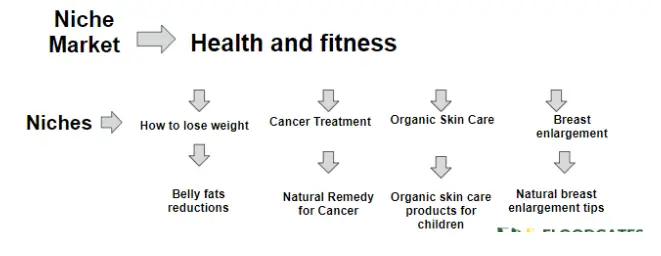
The next step is to know the demand for each of these keywords/topics, in order to know what to move forward with or drop from the list.
This is when keyword research becomes important.
b) Keyword Research:
Keyword research is ultimately one of the crucial parts of SEO.
No matter where you are in your organic traffic generation journey, keyword research (if done the right way), can be a game changer for your online business.
In this step, we’ll use the keywords/topics we identified during Niche Analysis and plug them into a keyword research tool to know the actual search demand (search volume) on the web.
The ideal principle is to go with the topics/keywords with high search volume and low competition, and drop others.
High search volume and low competition keywords are what you should aim to rank for on Google.
To do this, I always use a budget-friendly keyword research tool called Ubersuggest.
Recall that we identified the following skin care e-commerce niche keywords earlier
- Body cream
- Face scrub
- Cerave
- Body scrub
- Moisturizer
- Medix 5.5
- Skincare products.
Do a similar list related to your e-commerce niche and use ubersuggest or other sophisticated and more expensive tools like Ahref and SEMrush to look for the search volume for each.
Prioritise only keywords with high search volume and low competition and search difficulty.
See example 1 below with the keyword “Cerave”
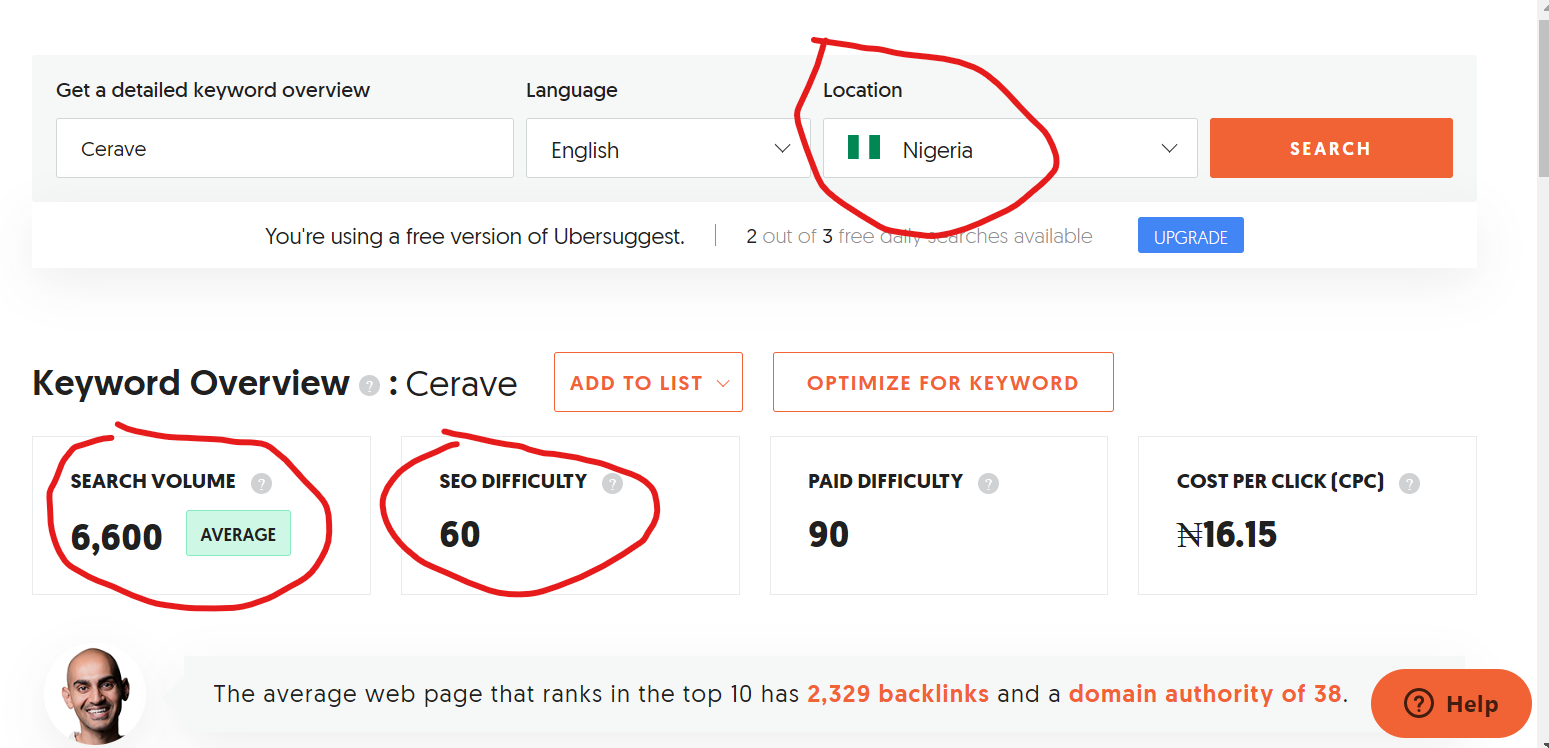
The search volume is 6,600 (decently high) at the time of writing this article but the SEO difficulty is 60, meaning it is a bit difficult to rank for this search term if your e-commerce website is new.
See example 2 below with the keyword “Medix 5.5”
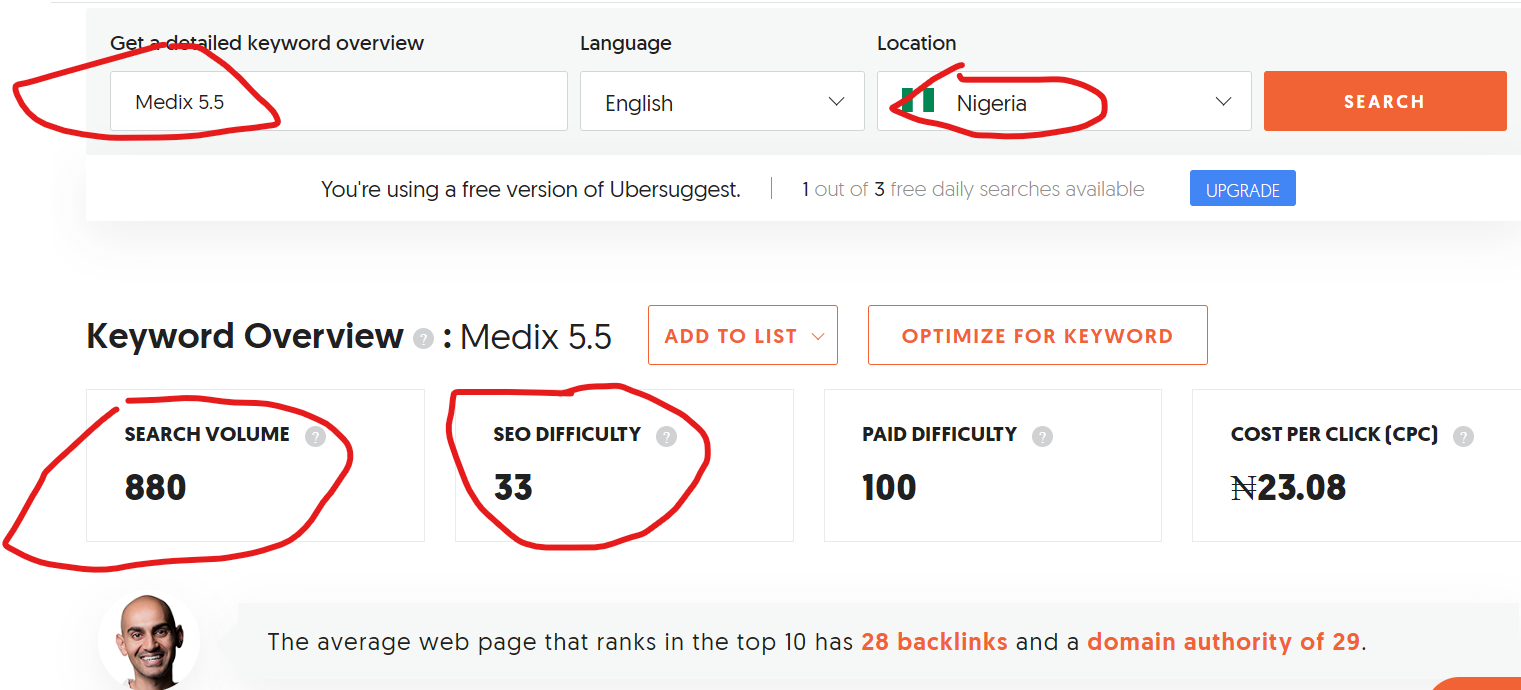
The search volume is 880 (decently okay at the time of writing this article) but the SEO difficulty is 33, meaning it is very easy to rank for this search term even if your e-commerce website is new.
Did you get the idea about keyword research?
Did you also notice how I limited my research to the location of my skincare e-commerce store?
If you are planning to serve a particular location (or country) with your e-com products, limit your research to the country.
Don’t worry if you sell different products on the e-commerce website, start by ranking for a search term that brings valuable traffic to your website, then scale to other search terms.
Also, once you begin to rank for your key search term, Google sees your site as an authority for that search term and places your content on its first page, that way people can visit your website more and begin to see (and eventually buy) other products.
What’s the next step after keyword research?
It’s Search Analysis
c) Search Analysis:
This is the process of discovering what people are actually searching for on Google as it relates to your selected e-commerce niche keywords.
In other words, SA simply means searching to know the most sought-after long-tail search queries on the web that are related to your niche keyword.
People use long-tail keywords (what Google refer to as search queries) when searching on Google, therefore your content should reflect what they are looking for.
Note: The essence of search analysis for a new e-commerce website is to find search queries with commercial and transactional Intent keywords and NOT Informational or Navigational Intent keywords.
The simplest way to do Search Analyses is to enter your selected keyword on Google and look out for the “More to ask” section on the search result page – this is also known as “People also ask” on Google search results.
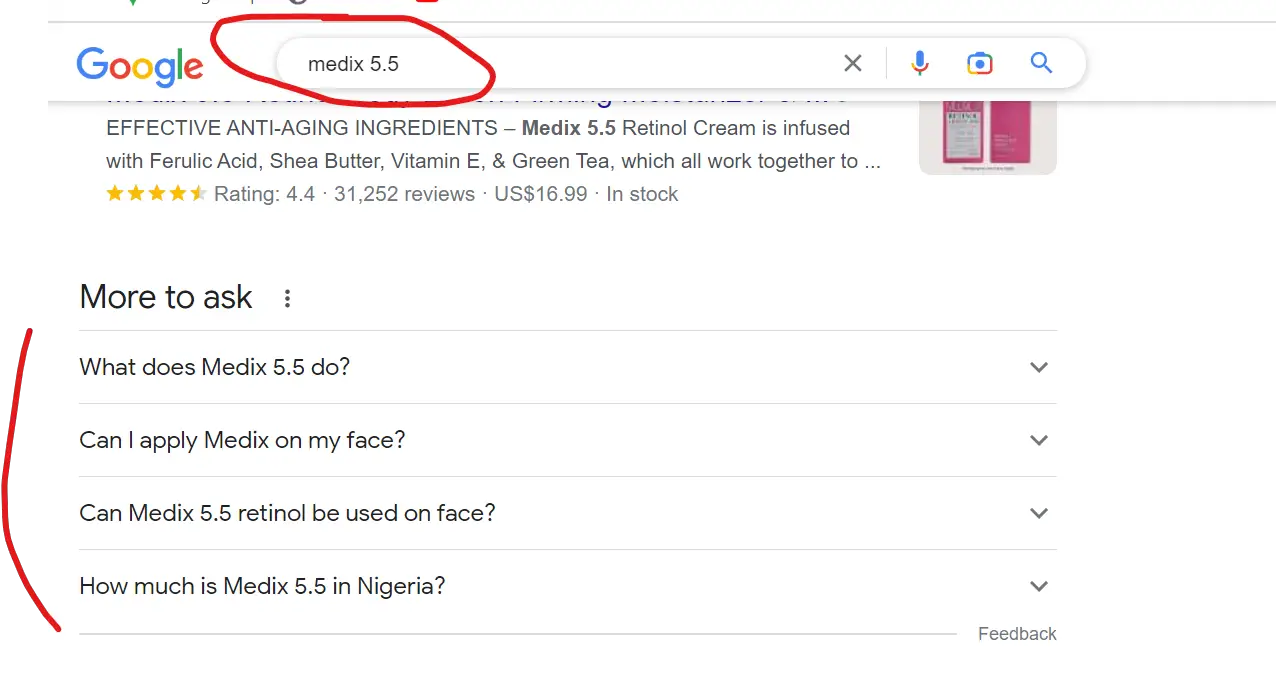
These are questions people commonly search on Google relating to the “Medix 5.5” topic/keyword.
The “more to ask” queries above have informational intent, you need to analyse the search queries to reveal and focus on commercial/transactional keyword intent.
I have a useful e-book that explains the advanced tactics on how to do search analysis, write SEO-optimised content and fill your website with content that will rank on search engines
Another more effective strategy is to use “Answer the Publish” (a tool by Niel Partel) to quicken the process of analysing and revealing all the search queries & frequently asked questions related to your e-commerce niche’s seed keyword.
Go to Answer the Public and insert your selected seed keyword, let’s use “Medix 5.5”, the example we have been using in this article.
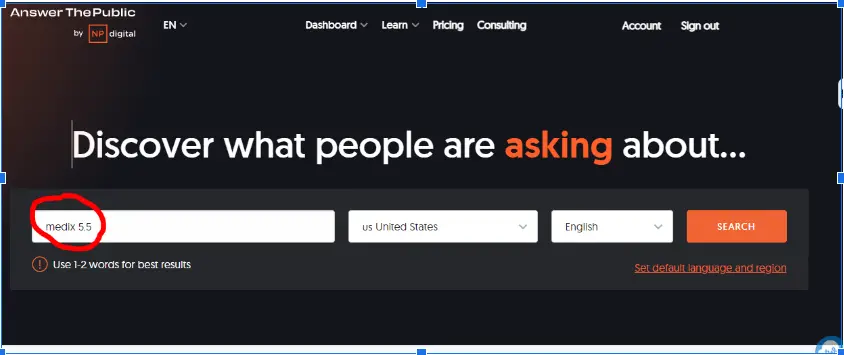
The result below shows all the historical searches regarding “Medix 5.5”.
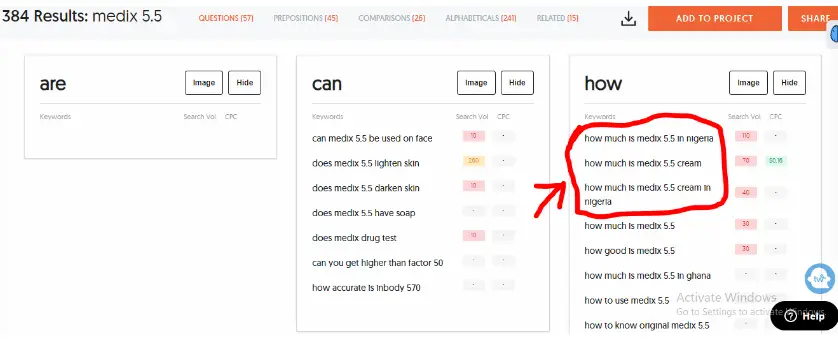
Since the goal is to attract only people with transactional and commercial intent (people with the intention to buy), it is advisable to only take note of queries with transactional and commercial intent. See the illustration in the image above.
Now that we know what people type on Google while trying to make a buying decision regarding “Medix 5.5” i.e. medix 5.5 boy cream, what’s the next step?
Create and fill your e-commerce blog with SEO-optimised content that answers every search query with transactional and commercial intent regarding Medix 5.5.
To effectively create content that will bring highly targeted traffic to your e-commerce store, you need to have skills in SEO content writing or hire an SEO writer.
I have created a comprehensive guide on how to become an SEO writer. The article covers in detail every piece of information needed to strengthen your SEO content writing capacity.
d) Link Buiding
After publishing highly optimised content, you need to build backlinks to quickly build authority for your e-commerce store and rank your articles on Google’s first page.
Link building simply means building backlinks from authority sites, because backlinks are Google’s number one off-page SEO ranking factor.
How to Get Quality Backlinks to Your E-commerce Store
These tips are vital in building quality backlinks;
- Write and publish guest posts on other relevant websites and link back to your e-com website
- Republish (or repurpose and publish) your existing content on other authority microblogging sites like Medium, LinkedIn and Quora – and nicely link back to your online store.
- Repurpose your existing e-commerce blog content into YouTube videos and point viewers back to your e-commerce store.
- Avoid posting on forums or websites with low domain authority
- Treat link building as a crucial aspect of your off-page SEO strategy to boost traffic to your e-commerce website – because the results can be mind-blowing.
Read this article on how to get free backlinks to your website, to learn more about free link-building techniques.
e) Local Business Directory Listing
This strategy is exclusive to e-commerce websites with a physical location.
If you have a physical store (apart from an online store), then increase visits to your physical store by attracting people searching for products like yours on Google. This Local SEO strategy can boost your sales and triple your income.
Here’s how it is done;
Conduct a search on Google with the keyword “Local Business Listing websites in (Insert your Country).
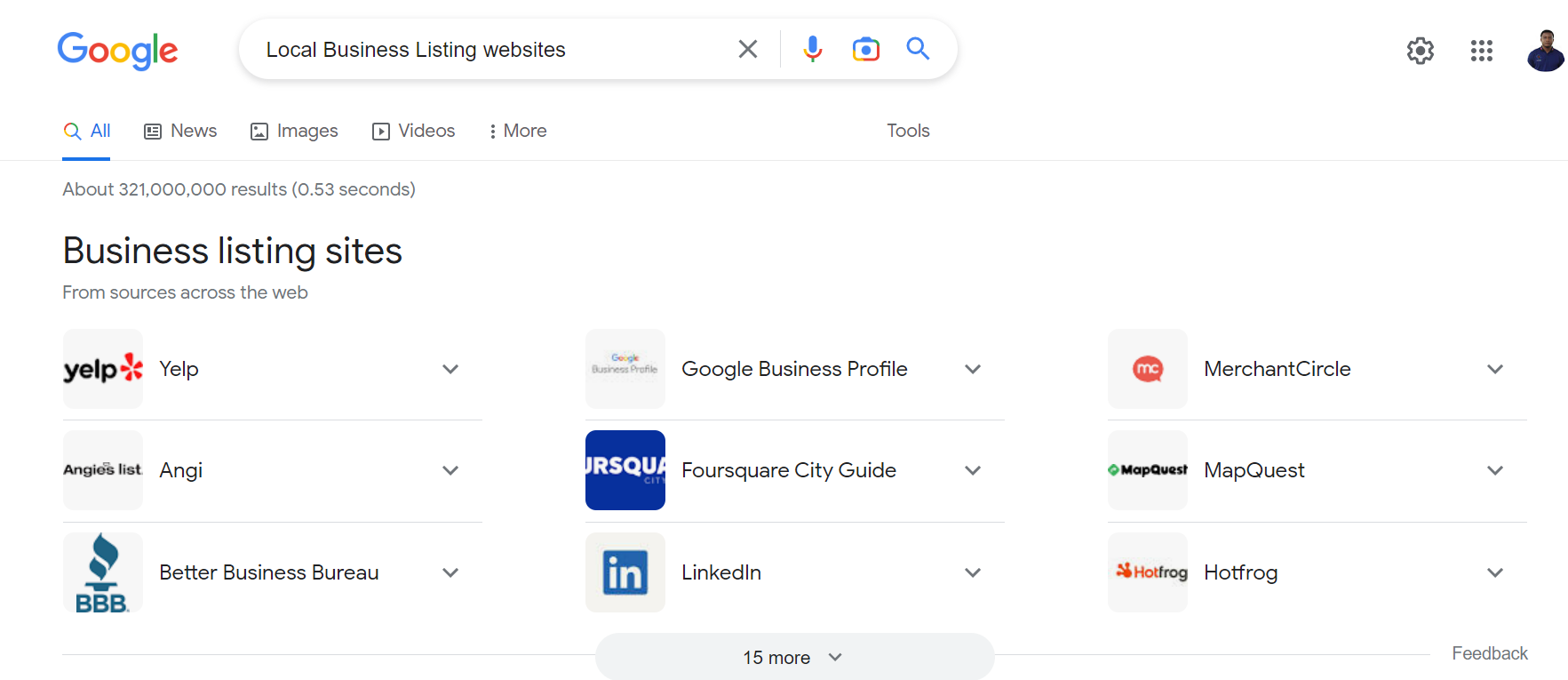
Sign up and list your business on each of these websites.
The golden trick is to ensure that your WNAP (Website, Name, Address and Phone number) is consistent across these websites, and tallies with the information on your website and on your Google My Business Profile. This is how Google identifies real businesses for Local SEO.
f) Podcasting
Podcasting can be a great way to reach a wider audience and attract new targeted traffic to your e-commerce website.
Podcasting is arguably one of the best (yet underrated) off-page SEO strategies to boost traffic and sales for products and services online.
RSS.com makes podcasting easier, they promise to automatically distribute your podcast to all podcast directories including Apple Podcasts, Amazon, Spotify, Google and more.
All you need to do is to recreate your existing content in audio format and use RSS.com to distribute it to different platforms.
Do not forget to point people back to your e-commerce store.
g) Social Bookmarking
Have you tried to save something on your web browser to come back to it later?
That’s bookmarking.
But there are social networking sites that make “saving to read later” easier, e.g. Pinterest. People can browse through pins and save them for later.
As an e-commerce store owner, you need to jump into a social bookmarking space and be actively contributing/publishing on the platform.
How’s Social Bookmarking important in boosting your off-page SEO?
When people save/bookmark your content, Google considers it useful and because results from social bookmarking sites are also listed on the Google Search Result page, it can be an added link-building and traffic-generation strategy.
Major 10 Social Bookmarking Websites with High DA
- Digg
- Medium
- Scoop.it
- Tumblr
- Slashdot
Hubspot and Infront.com have very details articles on this topic
E-commerce SEO Tools to Boost Sales
As an e-commerce marketer or store owner, you need to include these hand-picked tools in your strategy
1. Keyword research/off-page SEO tools
- Ubersuggest
- SEMrush
- Moz
- Google Trends
- Google keyword planner
- Answer the Public
2. Content Creation Tools
- Hemingway editor
- Grammarly
- Anti-AI content detection tools
- Plagramme – plagiarism checker
3. E-Commerce Sales Management Tools
- Helium 10
- Shopify
- Big Commerce
- Woocommerce
- Magento
What’s Next? – Launch Your off-page SEO strategy
Now that you have all it takes to rank your e-commerce store, get more traffic and boost sales, what’s next?
Put all you have read here into action. Implement one strategy at a time and watch your business grow (patience and consistency is key, results will not come overnight).
If you need an SEO consultant/SEO Company to handle your SEO strategy, implement all we have discussed here, and rank your e-commerce store on the first page of Google for guaranteed sales, look no further, I am an SEO Consultant with a proven track record, Book a Free Consultation Call with Me, and let’s discuss your business problems, I’ll help to get you results without guesswork.
